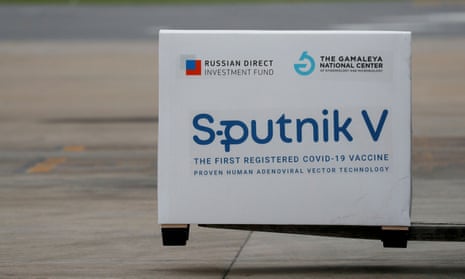Argentina’s gamble on the Sputnik V vaccine has left it in a “very critical situation” because of Russia’s failure to fulfill delivery commitments, according to an official letter to Moscow leaked on Thursday.
Russia owes Argentina 18.5m doses of its Sputnik V jab, over two-thirds of them vital second-component doses.
Only 12% of Argentinians are fully vaccinated so far, partly due to failed Sputnik deliveries of its second component. Another 37% have received only a single dose.
This compares disastrously with double-dose vaccination rates of over 60% in neighbouring Chile and Uruguay, countries that did not bet so heavily on the Russian vaccine.
The low two-dose vaccination rate leaves Argentina particularly exposed to the arrival of the Delta variant. Neighbouring Uruguay, meanwhile, has already approved moving to a three-dose regimen.
Argentina’s reliance on the Sputnik V vaccine was accentuated by a special vaccination law passed in October last year that effectively made it impossible for this country to import US vaccines such as Pfizer or Moderna. Argentina has relied instead on a mix of Sputnik, Sinopharm and AstraZeneca shots.
The lack of Sputnik’s second component, which has left 6 million Argentinians with just the first Russian jab, has become a charged political issue in the run-up to midterm elections here this November.
The political uproar left the government of the Peronist president, Alberto Fernández, little choice but to threaten to end Argentina’s contract with Russia.
“You are leaving us very little options to continue fighting for you and this project,” says the letter from the presidential Covid adviser Ceclia Nicolini to the Russian Direct Investment Fund, which markets Sputnik V worldwide.
The letter said Argentina “urgently” needed delivery of second doses and warned that “the entire contract is at risk of being publicly cancelled”.
Pressure from the centre-right opposition party Juntos (Together) recently forced Fernández to change last year’s vaccine law to accommodate the donation of Moderna and Pfizer vaccines from the US, a fact that was underlined in the letter to Moscow.
“We just issued a presidential decree that allows us to sign contracts with American companies and receive donations from the US,” says the letter which was leaked to the daily La Nación.
Argentina is meanwhile testing mixing vaccines to replace the second dose that Sputnik has failed to deliver.
Argentina is not alone in having problems with Russia’s vaccine. Other countries have terminated or reviewed their contracts to purchase Sputnik V amid reports of delayed shipments from Russia – and allegations that a royal middleman from the United Arab Emirates used exclusive resale rights for Sputnik V to charge large mark-ups across three continents.
Ghana’s health minister last week announced that his country had cancelled its Sputnik V contract with the Dubai-based middleman after he said he had been told that the supplier had “run out of stock and that they are waiting on the manufacturer to supply them.”
The middleman scheme was first revealed by the Moscow Times, which found in an investigation that Russia had awarded exclusive resale rights for Sputnik V to a minor Emirati royal.
Earlier this year, Kenya blocked the use of 75,000 Sputnik V jabs provided via the Emirati firm because of concerns that they had not come directly from the manufacturer in Russia.
